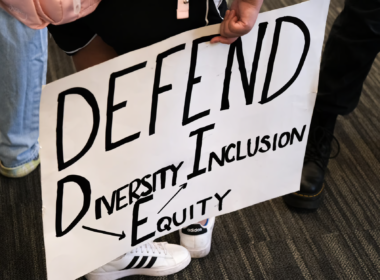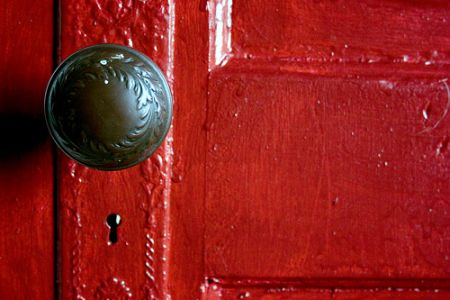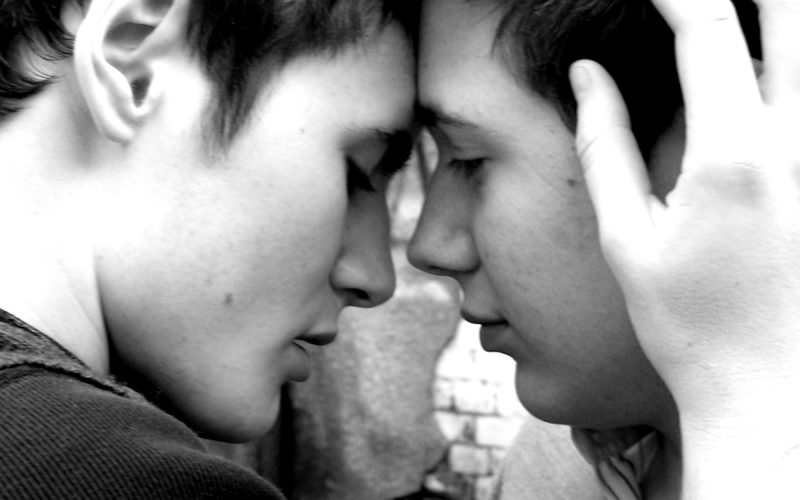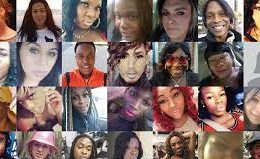It was a warm, spring day in northern Mississippi when I asked my brother’s friend to humor me with an impromptu photo shoot. Despite his insecurities, he obliged, pulled off his shirt, and let me click away, never once saying anything inappropriate about his near nakedness or my eagerness to capture it on film. Several more shoots would follow the first, and as I got to know him better, I became quite comfortable teasing him and cracking jokes, all of which he took with a grain of salt—that is, until the joke centered around his sexual orientation.
The topic of conversation was his perpetual bachelorhood, an innocent inquiry on my part, and something he blamed solely on the disinterest of females. That struck me as odd considering his pleasantly structured face and perfectly chiseled abs, and like any good friend would, I jokingly promised I wouldn’t enlighten anyone as to his current whereabouts—the closet. Having a relatively high number of male friends, I expected the typical response of a scoff and grimace, followed by some form of playful retaliation, but what I got in return surprised me. He looked at me with his brow furrowed in anger and through gritted teeth said, “That’s not funny. Where I come from, saying those things about someone will get you punched in face.” I took that to mean my joke was not appreciated, and had I been a male, he probably would have hit me for implying he was gay.
Days later I apologized, but he barely accepted, all but squirming uncomfortably as he tried to shift the conversation to something else, anything else. Realizing what his reactions might be indicating, I decided to do something that would only make the situation worse: I outright asked him if he was gay. With his fists clenched and nostrils flaring, it appeared he was on the verge of a teary confession, but at the last second he decided that stomping away angrily was better than verbalizing feelings he most likely didn’t even want to address in his own mind. Needless to say, we haven’t spoken much since then.
Southern culture is something altogether different from what the average American is accustomed to. It’s not simply getting picked on at school for being gay; it’s being so scared of what will happen if anyone finds out your sexual orientation that you ignore your feelings completely, put on a happy face, and marry a suitable mate of the opposite sex. Studies show that in America roughly twenty percent of gay men go on to marry straight women, and it’s not any better elsewhere. An estimated ten million women in China are married to gay men. American conservatives are in such an uproar over the increasing number of people living openly gay lives, but if estimates are correct, the true number of gays, both living openly and not, would be staggering to anyone. Unfortunately, even in a world were gay is becoming more and more common, for people living in certain regions, it’s still as much a crime as it was fifty years ago.
At only eighteen Anna Hopkins was thrown out of her house by her mother after admitting she was dating a girl. Now nineteen, she’s working full time to support herself, and without the aid of her parents, is currently unable to attend college. And this kind of harsh judgment certainly does not extend to just family.
Mark Thomas (28), a local Jackson Mississippi native known for his charisma and voice in the drag scene, can’t seem to land a job despite graduating from a reputable college and having years of experience. His phone interviews go well, but the moment he steps into the office for the real interview, things tumble downhill quickly. “I think they look past my credentials and my expensive suit, and go straight to my eyebrows. Men don’t pluck their eyebrows unless they secretly dress in drag, and everyone know that. It’s why they never call back. I suspect they just don’t want a tranny working for them.”
Another Mississippi native, Chane Radcliff (22), chose to keep his sexual orientation to himself during high school, but even without the confession, his schoolmates still suspected and acted accordingly. He says, “They would push me down in the halls and then run off before any teachers would see. I even got quite a few black eyes. I don’t think I had one friend the entire four years.”
Examples of blatant discrimination can be seen and felt from all age groups and in every setting conceivable in the rural south, but while this behavior is truly reprehensible, the very thin silver lining is that it can often be brought to light and fought against. But what about those acts that may or may not be acts of prejudice? How does one fight against that?
In March of 2012, gay residents of Jackson Mississippi organized a march to highlight the discrimination directed at the LGBT (Lesbian, Gay, Bisexual, Transgender) community. At the last minute, Jackson police informed the already assembled group of marchers that their permit had been denied, that they were not allowed to march in that area and had to leave immediately. Several officers were even reported telling the group that it’s illegal to be openly gay in Mississippi. The given reason for denying the permit, however, was cited as failure to obtain proper documentation, the rejection said to have nothing to do with the topic of the march. While it’s a very real possibility that organizers failed to meet the proper requirements, GetEQUAL’s executive director and Jackson native, Robin McGehee (http://getequal.org/blog/2012/03/01/press-release-lgbt-march-in-mississippi-shut-down-by-police/ ), doesn’t buy it. He says, “Despite Mississippi’s long history of racial, gender, and economic discrimination, the state continues to use deceptive tactics like insurance requirements to prevent people from simply walking down the street as openly gay. You would think that Mississippi would have learned its lesson and would try to shake off the chains of its discriminatory past, but this action by Jackson police will simply cement the state’s reputation as the leader of bigotry and discrimination.”
Whatever your opinion might be on the legitimacy of the reasons given to the marchers, it’s still a well-known fact that a few of the southern-most states are behind the times. Not only do gay southerners have to live in fear of the kind of discrimination that gets them kicked out of the house or even punched in the face for simply making a joke, they also have to get used to the fact that being gay in this region means having nowhere to go. In the more rural parts, there are no clubs, no popular organizations, no social events targeting the LGBT community; the rallies are few and far between, even if larger cities, and the gay bars either hidden in the shadows or are non-existent. So in small towns like Booneville, Mississippi, where talking about being gay is still taboo, where exactly is the LGBT community supposed to go in search people who understand, people they can connect with?
“I go online—forums and stuff. Most of my good friends are in other states. They get me the way people around here don’t,” says Jarrod, a lifelong native of Tupelo, Mississippi. “And it’s fine that people around here don’t get me because it saves me from having to come out to anyone I know and risk everyone in my community finding out I’m gay. I couldn’t deal with the backlash, honestly.”
Of all the LGBT people I’ve spoken with on the woes of being gay in the south, the recurring theme seemed to be the desperate need to keep their secret safely hidden from family and friends, and the isolation they feel as a result. While the internet certainly plays a large role in helping people connect to others who are just as scared of coming out to friends and family, it’s by no means the solution. But the sad truth is that when a person lives in the south, having no feasible way to leave for greener pastures, they really only have two options: tell the truth and face the consequences, or guard their secret with everything they have. With the consequences often being abandonment and violence, and sometimes even murder, it’s really no wonder so many maintain heterosexual relationships. That’s exactly what Ricky Timms is doing.
Ricky first fell in love with a boy named Patrick at just 13, but when Patrick’s parents learned of their relationships, they moved Patrick out of state. Aside from two very close friends, Ricky never told anyone of his attraction to men, never informed friends of his plan to move to California where he would finally be free to date whomever he wanted. Plans changed though, when, in the midst of trying to keep up the charade of heterosexuality, he accidentally impregnated his girlfriend. At just 24, he’s now married with two kids and admits he stays with a woman he doesn’t love only for the sake of his children. He also admits that he doesn’t know how much longer he can continue living as a straight man. We all find ourselves judging these situations, wanting to either yell at the person for being such a coward or to encourage them to leave, but as easy as it is to tell someone they should be themselves, live as they want, love who they love, it’s truly just not that simple for homosexuals living in a place where being openly gay is not only widely considered a sin, but is still very much illegal. If that’s not bad enough, as of right now only 31 states recognize gay-motivated violence as a hate crime. Mississippi is not one of these states.










Let’s face it. Living in the South is living in another America. I was born and raised here and my family has been in the South since 1704 so it runs deep in my heritage too. There are a lot of great things about the South but acceptance of those different than the masses has never been one of them, obviously. Oppression and homophobia are almost ways of life here. However, I think Southerners are changing mostly due to the influx from other states but it will be a really long long long and slow change and even then there will always be severe homophobia in the South. It just is what it is.
Let’s face it. Living in the South is living in another America. I was born and raised here and my family has been in the South since 1704 so it runs deep in my heritage too. There are a lot of great things about the South but acceptance of those different than the masses has never been one of them, obviously. Oppression and homophobia are almost ways of life here. However, I think Southerners are changing mostly due to the influx from other states but it will be a really long long long and slow change and even then there will always be severe homophobia in the South. It just is what it is.